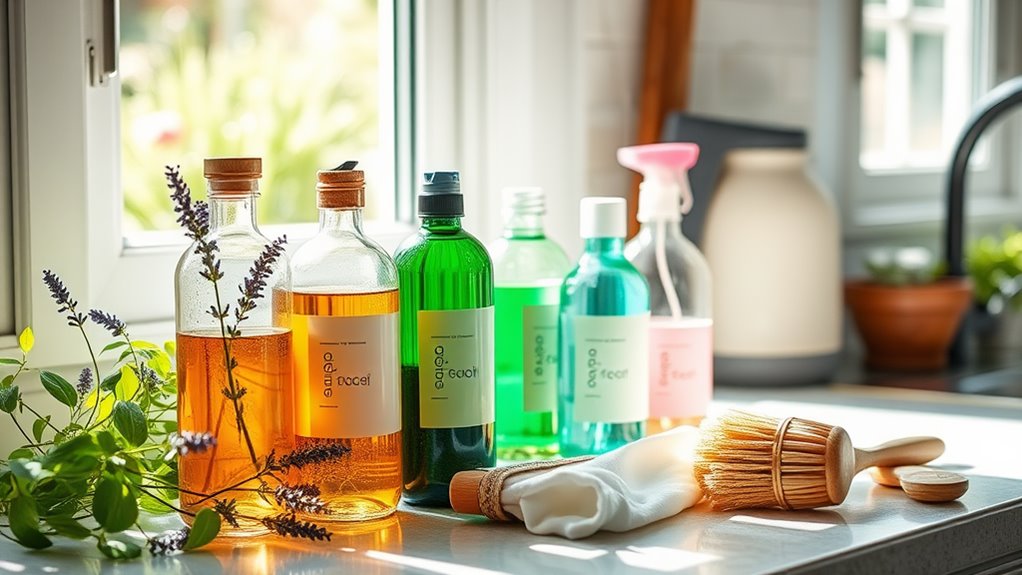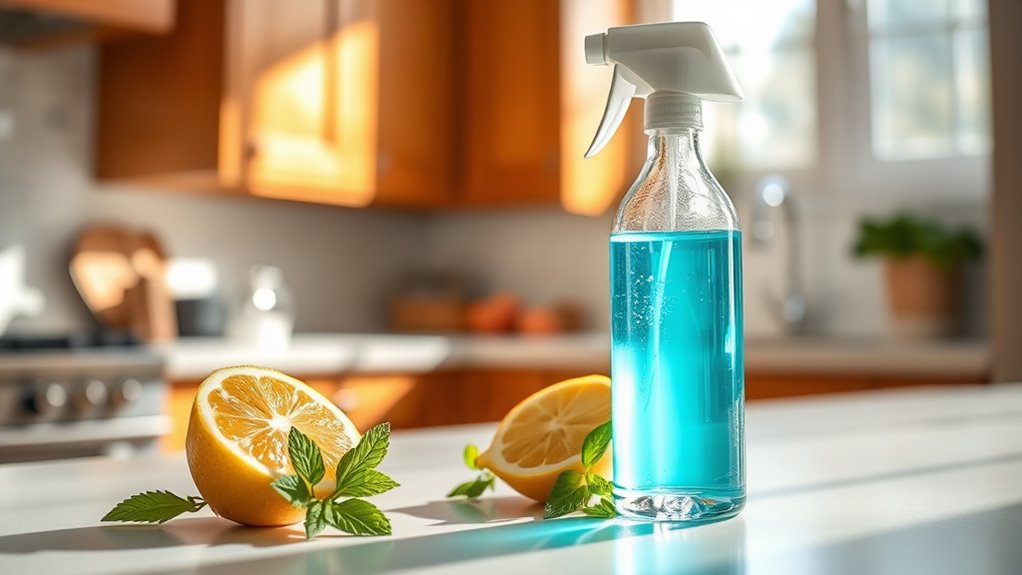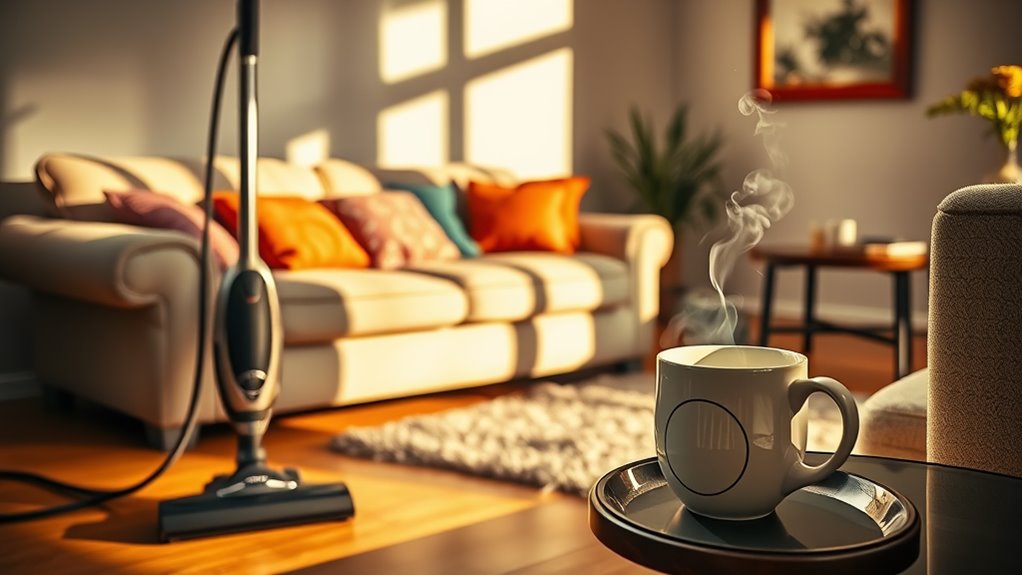These Non-Toxic Cleaners Are Perfect for Anyone With Allergies
If you’ve got allergies, switching to non-toxic cleaners can make a big difference in your home. These products reduce allergens and irritants while promoting a healthier environment. Look for items with plant-based ingredients like vinegar and baking soda. Brands like Seventh Generation and Method offer effective solutions without harsh chemicals. Plus, DIY options let you customize your cleaning routine. Keep exploring to discover even more ways to enhance your living space and minimize allergy triggers.
Key Takeaways
- Non-toxic cleaners reduce allergens and irritants, promoting a healthier indoor environment for allergy sufferers.
- Ingredients like vinegar and baking soda effectively clean without harmful chemicals that trigger allergies.
- Brands like Seventh Generation and Method offer hypoallergenic formulations safe for families and pets.
- DIY solutions, such as vinegar and water, provide customizable cleaning options while ensuring safety from allergens.
- Regular use of non-toxic cleaners improves indoor air quality, reducing allergy symptoms over time.
Understanding Allergies and Cleaning Products
When you’re battling allergies, the last thing you want is to introduce more irritants into your home.
It’s essential to understand how traditional cleaning products can exacerbate your symptoms. Many contain harsh chemicals that release volatile organic compounds (VOCs), which can trigger allergic reactions. Additionally, these substances often contribute to indoor air pollution, making it crucial to choose safer alternatives. Using pet-safe natural cleaning solutions can help maintain a clean environment while reducing the risk of allergy triggers. Creating a safe all-natural disinfectant spray at home can also provide an effective cleaning option without harmful chemicals. Incorporating affordable cleaning solutions into your routine can further enhance your efforts to keep allergens at bay.
Instead, you should seek out allergy-friendly cleaners that are free from these harmful substances. Look for products labeled as hypoallergenic and non-toxic, ensuring they won’t compromise your indoor air quality.
You’ll find that using natural ingredients like vinegar, baking soda, and essential oils can effectively clean your space without the risk of allergic flare-ups. Additionally, many natural disinfectants provide powerful cleaning properties while being gentle on both your health and the environment.
The Benefits of Non-Toxic Cleaners
Choosing non-toxic cleaners not only helps protect your health but also benefits the environment. By opting for these products, you minimize chemical exposure, reducing allergy symptoms and respiratory issues. Additionally, using natural cleaners can contribute to a healthier indoor environment, as they are often free from harmful toxins found in traditional cleaning supplies. Non-toxic cleaners are biodegradable, ensuring that they don’t harm water systems or wildlife. Furthermore, creating your own eco-friendly cleaning solutions at home allows you to customize the ingredients used for your specific needs. Moreover, many of these cleaners, such as those made with natural ingredients, can be easily created at home, saving you money and reducing packaging waste. It’s crucial to be aware that some traditional cleaning products can secretly damage surfaces, which can lead to costly repairs over time. Using a DIY bathroom cleaner can further enhance your cleaning routine by utilizing safe and effective ingredients.
| Benefit | Description | Impact |
|---|---|---|
| Healthier Home | Reduces allergens and irritants in the air | Improved well-being |
| Eco-Friendly | Made from natural ingredients | Supports sustainability |
| Versatile Use | Effective on various surfaces | Saves money and space |
Key Ingredients to Look For
To create a healthier home environment, it’s vital to know which key ingredients to look for in non-toxic cleaners.
Start with plant-based surfactants like coconut or corn-derived compounds, as these break down dirt without harsh chemicals. Look for essential oils such as tea tree or lavender, which not only provide natural fragrance but also possess antibacterial properties. Additionally, using essential oils in your cleaning routine can enhance the effectiveness of natural disinfectants while promoting a pleasant atmosphere. Incorporating natural methods in your cleaning can significantly contribute to maintaining a fresh bathroom environment. For example, combining vinegar and baking soda creates a powerful cleaning reaction that can dissolve stubborn grime. Using vinegar and baking soda together is a great way to utilize natural disinfectants that work effectively without irritating allergies. Moreover, utilizing steam cleaning can further ensure that surfaces are sanitized without the use of chemicals.
Vinegar and baking soda are excellent for tackling tough stains and odors, while citric acid effectively cuts through grease.
Avoid synthetic fragrances and bleach, as they can trigger allergies. Instead, favor biodegradable ingredients that are safe for both your family and the planet.
Popular Non-Toxic Cleaner Brands
Several popular brands have made a name for themselves in the non-toxic cleaner market, offering effective solutions for allergy sufferers. Brands like Seventh Generation and Method focus on plant-based ingredients, ensuring you’re cleaning without harsh chemicals.
Mrs. Meyer’s Clean Day combines essential oils with eco-friendly formulations, delivering delightful scents that won’t irritate your senses. Ecover emphasizes biodegradable materials, making it a sustainable choice while maintaining cleaning power.
If you’re after versatility, consider Branch Basics, which allows you to create your own solutions from a concentrated formula. These brands prioritize both efficacy and safety, so you can maintain a clean home without compromising your health.
Choosing any of these options means you’re investing in a cleaner, healthier living environment.
DIY Non-Toxic Cleaning Solutions
When you want to keep your home clean without exposing yourself to harsh chemicals, DIY non-toxic cleaning solutions offer an effective and simple alternative.
You can create powerful cleaners using everyday ingredients like vinegar, baking soda, and essential oils. For an all-purpose cleaner, mix equal parts water and vinegar in a spray bottle, adding a few drops of your favorite essential oil for a pleasant scent.
Baking soda works wonders for scrubbing surfaces; just sprinkle it on, scrub, and rinse. For glass cleaning, combine water with a splash of vinegar for a streak-free shine.
These solutions not only clean effectively but also guarantee your home remains safe and healthy, allowing you to master your cleaning routine with confidence.
Tips for Reducing Allergens in Your Home
Although allergens can be a constant presence in your home, there are effective strategies to minimize their impact.
Start by regularly vacuuming carpets and upholstery with a HEPA filter vacuum to trap dust and pet dander. Wash bedding weekly in hot water to eliminate dust mites.
Keep humidity levels below 50% to discourage mold growth; consider using a dehumidifier if necessary. Implement a no-shoes policy indoors to reduce outdoor allergens.
Use air purifiers with HEPA filters in high-traffic areas to improve air quality. Finally, declutter your space to limit dust accumulation.
How to Properly Use Non-Toxic Cleaners
Maintaining a clean home is essential for reducing allergens, and non-toxic cleaners can help you achieve that without introducing harmful chemicals.
To use these products effectively, first read the labels and understand their specific applications. For surfaces, spray the cleaner directly and let it sit for a few minutes to break down dirt and grime.
When wiping, use a microfiber cloth to trap allergens effectively. For tougher stains, consider a gentle scrub brush to avoid scratching surfaces. Always test a small area first to verify compatibility.
Finally, rinse surfaces with water, if necessary, to remove any residue. By following these steps, you’ll maximize the efficiency of non-toxic cleaners while promoting a healthier living environment.
Transitioning to a Non-Toxic Cleaning Routine
Shifting to a non-toxic cleaning routine can feel overwhelming at first, but it’s easier than you might think. Start by identifying your most-used cleaning products and gradually replace them with non-toxic alternatives. This approach minimizes waste and allows you to adapt smoothly.
| Product Type | Conventional Cleaner | Non-Toxic Alternative |
|---|---|---|
| All-Purpose Cleaner | Bleach-based cleaner | Vinegar and water mixture |
| Glass Cleaner | Ammonia-based cleaner | Water with lemon juice |
| Bathroom Cleaner | Chemical disinfectants | Baking soda and essential oils |
Frequently Asked Questions
Are Non-Toxic Cleaners Effective Against Tough Stains and Dirt?
Non-toxic cleaners can be surprisingly effective against tough stains and dirt. They work well when you use the right techniques and allow them to sit for a while, ensuring you achieve the desired results without harmful chemicals.
How Long Do Non-Toxic Cleaners Typically Last After Opening?
Non-toxic cleaners usually last six months to a year after opening, depending on their ingredients and storage conditions. To maximize effectiveness, store them in a cool, dark place and check for any changes before use.
Can Children Safely Use Non-Toxic Cleaning Products?
Yes, children can safely use non-toxic cleaning products under adult supervision. You should educate them on proper usage and handling, ensuring they understand the importance of safety while encouraging responsibility in household tasks.
Are There Any Non-Toxic Cleaners Suitable for Outdoor Use?
Yes, you can find several non-toxic cleaners suitable for outdoor use. Look for options specifically labeled for outdoor surfaces, like plant-based solutions that effectively tackle dirt and grime without harming the environment or your health.
How Do I Dispose of Non-Toxic Cleaners Properly?
When disposing of non-toxic cleaners, check local guidelines. Rinse containers, recycle when possible, and pour small amounts down the drain with water. Always follow specific instructions on product labels for safe disposal practices.



